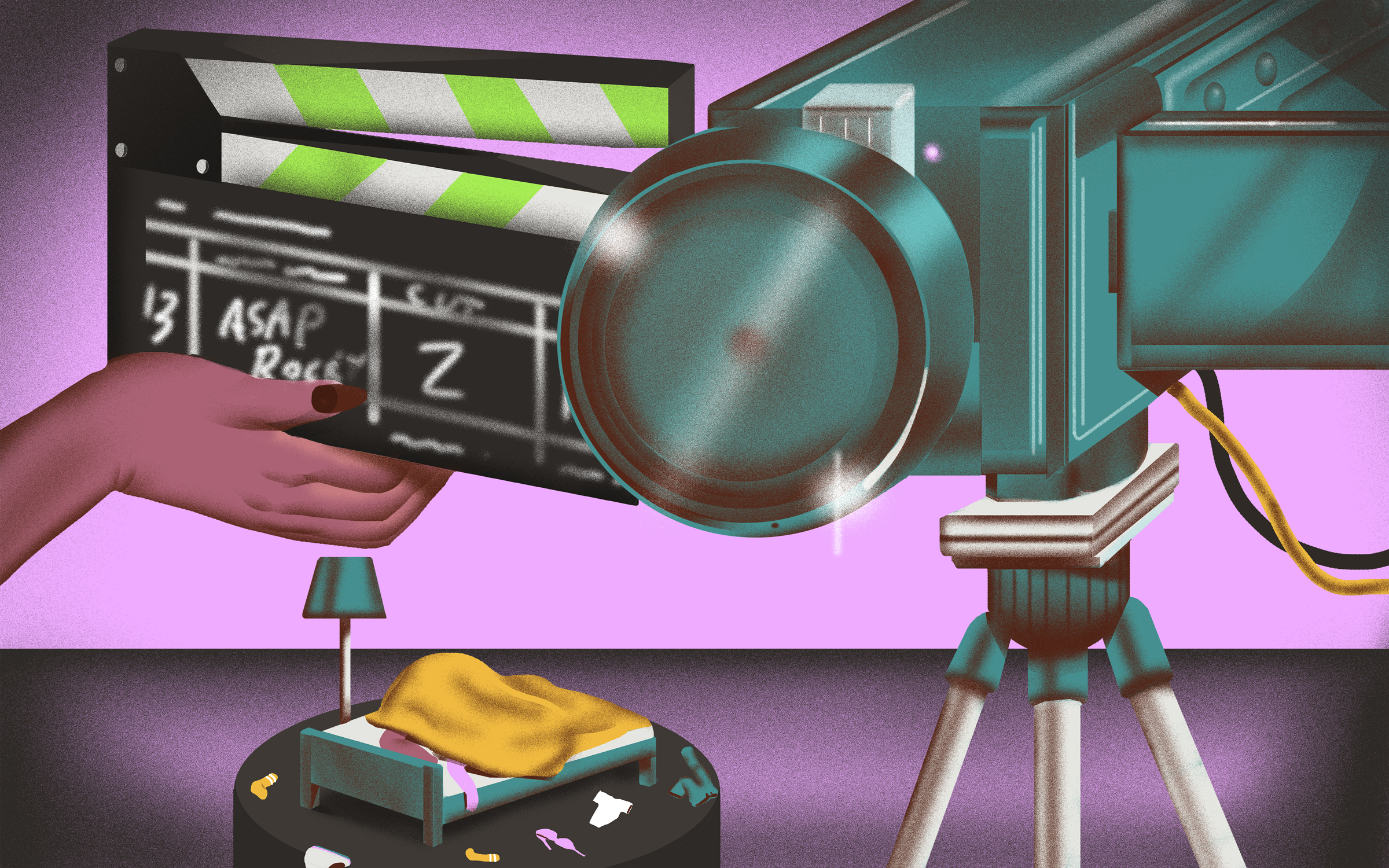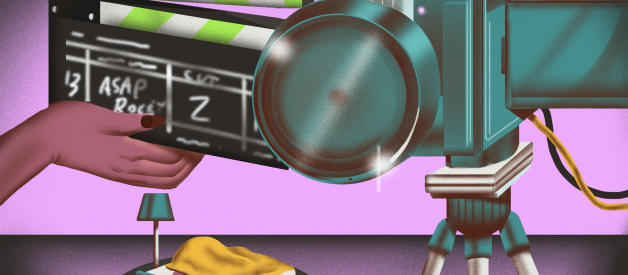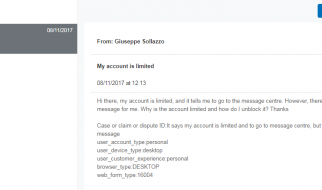Celebrity leaks are always good for a voyeuristic thrill, but they also bring out the worst in us
 Illustration: Richard Chance
Illustration: Richard Chance
 ?Sex? might not be the most searched word on Google ? that honor goes to ?Facebook,? for some reason ? but it?s up there. It?s the engine of the internet, always has been. And as that engine has evolved from photos to videos to people streaming their own freaky tales on sites like onlyfans, it?s become not just a tool for titillation, but self-promotion.
?Sex? might not be the most searched word on Google ? that honor goes to ?Facebook,? for some reason ? but it?s up there. It?s the engine of the internet, always has been. And as that engine has evolved from photos to videos to people streaming their own freaky tales on sites like onlyfans, it?s become not just a tool for titillation, but self-promotion.
That?s why, when a recording of A$AP Rocky doing the deed dropped in mid-December, it didn?t seem to be anything earth-shattering. One of hip-hop?s preeminent sex symbols getting busy isn?t shocking. What did surprise viewers was just how anticlimactic the whole experience was: A$AP limping his way through the back shotting clip to the soundtrack of his own non-autotuned moans. The ensuing social media roast, in which Pretty Flaco?s demonstrably unpretty stroke game came under review, got so hot that he issued a statement, uh, ASAP:
There was a time when just the release of such a tape would have been enough to boost Rocky?s profile, even his sales. But two data-cap-stretching decades into the age of porn on demand, our expectations for what makes a good sex tape have really switched up. We?ve gone from stiff-arming the celeb leak to analyzing clips with the pure, shit-eating joy of Tony Romo during a Sunday night film study. In Rocky?s case, that scrutiny was centered in hypocrisy: How could an artist whose persona and catalog are rooted in sexual prowess be so (seemingly) wack between the sheets?
That we?d reached this question at all signaled a shift in attitudes around sex tapes broadly, but it also articulated what we expect from sex tapes ? particularly those featuring celebrities, and extra-particularly those featuring Black celebrities. For Black men, the bar is outsized and proficient peen work; for Black women, there?s an assumption of seduction and insatiability.
While we?ve finally begun to talk about sexuality openly, our response to sex tapes often demonstrates our worst impulses ? and reveals how truly devalued privacy has become.
Those expectations are rooted in the same racist patriarchal tropes that this country has employed for centuries, of course, but the current state of our NSFW Rotten Tomatoes act truly springs from the digital era. The information superhighway not only made physical media all but extinct?save for those poor nostalgiacs diggin? in the crates at the local sex shop?but also removed all the usual roadblocks to distribution. In other words, any filmed content, including sex, could leap from person to person at the speed of a DSL connection.
The days of looking under big cuz?s bed for gummy Jet magazines are done; the same goes for rifling dresser drawers in search of a suspiciously blank DVD-R. Once a precious resource, sex now totally permeates the communication networks that unite the world. And though pundit after pundit has bemoaned how internet porn has stunted a generation of men and women, you?ve gotta admit that that same generation has the sexual discourse game on lock. What we?re down to discuss has widened and become more fluid. Kink-shaming is obsolete. Sex positivity reigns.
Yet, while we?ve finally begun to talk about sexuality openly, our response to sex tapes often demonstrates our worst impulses ? and reveals how truly devalued privacy has become.
 Despite decades of rumors about clips involving Johnny Carson and Marilyn Monroe (not together), no celebrity sex tape saw the light of day until 1988, when footage emerged of Rob Lowe and two women ? one of them only 16. (The age of consent at the time in Georgia, where it happened, was 14, which? well, that?s a whole other piece.) Mass scorn put his career on ice for a good decade; while much of that was due to the whole sex-with-a-minor thing, the moment was also one of genuine societal discomfort. Sex scandals were one thing, but this was documented. We?d all been implicated as voyeurs, with no framework of how to process it.
Despite decades of rumors about clips involving Johnny Carson and Marilyn Monroe (not together), no celebrity sex tape saw the light of day until 1988, when footage emerged of Rob Lowe and two women ? one of them only 16. (The age of consent at the time in Georgia, where it happened, was 14, which? well, that?s a whole other piece.) Mass scorn put his career on ice for a good decade; while much of that was due to the whole sex-with-a-minor thing, the moment was also one of genuine societal discomfort. Sex scandals were one thing, but this was documented. We?d all been implicated as voyeurs, with no framework of how to process it.
When Pamela Anderson and Tommy Lee?s honeymoon tape emerged in 1998, though, we started making our peace with that voyeurism. The internet may have barely been able to deliver video files, but it was powerless to resist a Playboy centerfold and a hair-metal icon, each endowed with decidedly non-average dimensions. Viral Sex Tape 1.0 had officially arrived.
A year later in the U.K., pop star Dane Bowers and his then-girlfriend Katie Price?s sex tape leaked, showing the embattled singer performing some pretty toe play that was more cause for embarrassment than anything else. And in 2003, when footage emerged of Paris Hilton and ex-boyfriend Rick Salomon, it marked the first time (but not the last) that sex-tape notoriety increased someone?s fame. The scandal didn?t just represent a turning point in the sex tape?s cultural value, but in its potential as a revenue stream for the carnally canny; after Salomon allowed a company to distribute the footage under the title 1 Night in Paris, it sold more than 700,000 copies.
Still, while sex tapes had become online curios, their links emailed around offices and posted on message boards, they weren?t getting the Zapruder-level analysis that they invite today ? until Kim Kardashian, Superstar dropped in 2007. Originally shot five years earlier and sold to porn studio Vivid Video, the footage of Ray J and not-yet-superstar Kardashian was the first to feature a prominent Black celebrity actively engaging the camera. (A clip of rapper Eve and Stevie J had emerged in the early 2000s, but its fourth wall remained intact.) Brandy?s little brother flexed for the camera, directed Kim, and made jokes as if he was speaking directly to an audience.
Suddenly, sex tapes became performance art. Entertaining enough to invite attention beyond the initial jolt, and timed perfectly to a generation of social media platforms and blogs that gleefully discussed everything from the camera angles to the sex itself. People, even other celebrities, discussed Ray J?s package and Kim K?s sedated presentation. Porn theaters were long dead, but online we had a new lobby to hang out in ? one in which we could form and broadcast opinions with little thought to their validity or consequences. The attitudes of nudes and recordings changed forever.
As much fun as Ray J seemed to be having, though, online reactions implied that the vid played right into old racist tropes of an energizer-bunny Black buck and a docile, if satisfied, Jane needing rescue. This was the lens through which we viewed the most profitable sex tape ever made, tainting a newly adult generation with the same anti-Blackness that had infected adult films in the ?90s.
After Kim and Ray, sex tapes fundamentally changed, becoming a revenue runoff from the reality-TV ecosystem ? and lacking the grainy, indie feel of their predecessors. Footage of Love and Hip Hop?s Mimi Faust and her then-fiancee Nikko Smith was so slickly produced that most people got their jokes off on Faust?s ridiculously sturdy shower rod and then went back to whatever they were doing. Faust and Smith pocketed some racks for their effort, but the tape didn?t move the needle on her career. What was missing? Not sex. The problem was authenticity; dressed up as illicitly procured private footage, the clip was in fact too staged to satisfy.
 Here?s the thing. The real crux of the fuxx, the element of sex tapes that gets the timeline scrolling and the splash emoji firing, is their amateurism. In fact, it could be argued that the success of celeb leaks first signaled our larger appetite for non-professional pornography. While the market for amateur porn has personalized online porn consumption ? with custom clips and DIY streaming platforms driving revenue like few other segments of the industry ? it also embodies the collision between privacy and our expectations. The more porn fell into cartoonish exaggeration, the more people wanted something that felt real. And what?s more real than footage a celebrity clearly didn?t want circulating in the wild?
Here?s the thing. The real crux of the fuxx, the element of sex tapes that gets the timeline scrolling and the splash emoji firing, is their amateurism. In fact, it could be argued that the success of celeb leaks first signaled our larger appetite for non-professional pornography. While the market for amateur porn has personalized online porn consumption ? with custom clips and DIY streaming platforms driving revenue like few other segments of the industry ? it also embodies the collision between privacy and our expectations. The more porn fell into cartoonish exaggeration, the more people wanted something that felt real. And what?s more real than footage a celebrity clearly didn?t want circulating in the wild?
Our appetites for the illicit haven?t always been so unexamined. In 2014, when an iCloud hack resulted in hundreds of celebrity nudes being leaked on the internet, we recognized it as a massive breach of privacy. Thinkpieces challenged us to complicate our desire for nudes, while denigrating those responsible for the leaks; Reddit ultimately shut down boards that provided links to the images. Yet, that outrage hasn?t persisted. Whether it?s the tension between the solo nature of viewing porn and the collective nature of talking about it, or some other mechanism entirely, leaks simply engender a different kind of fervor than a preplanned recording.
These days, the celeb sexcapade is much more about criticism and jokes than voyeurism and titillation. A recent slew of nudes and sex tapes have actually featured more famous men ? and not just Draymond Green?s infamous Snapchat self-own. As the decade closed out, the internet was awash in man bits allegedly belonging to some of the biggest sex symbols in pop culture, from Usher to Steph Curry to DaBaby. A$AP Rocky wasn?t the only ones with fuckin? problems.
While Steph Curry?s chico stick was proven fraudulent, online chatter about his purported endowment was once again louder than the voices talking about how exactly those images got online in the first place. This focus is part and parcel of racist patriarchy, of course ? but does commenting on the art make us complicit in its artifice? Can a sex tape even feel compelling without violation? Or, most cynically of all, does it matter? Hypocrisy has never stopped folk from getting their dick jokes off, and sex tapes are some of the few pieces of media that can still elicit credible shock.
That we can talk about sex and sexuality so publicly feels like a blessing previous generations sorely needed ? but that conversation seldom touches on consent, invasion of privacy, or the insidious ways anti-Blackness has wormed into our common sexual discourse. It would be fascinating to wonder what kinds of movements toward sexual liberation are possible with a little more discretion.
More sex talk on the internet is great; perhaps even greater would be a healthier, more empathetic version of it. Unfortunately, the evidence of that health can only be measured in times when we all come together, take a seat in the new digital sex cinema, and ready our Twitter fingers for the next clip coming to a timeline near you.


